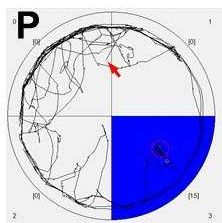(Phys.org) —Tufts University biologists using new, automated training and testing techniques have found that planarian flatworms store memory outside their brains and, if their heads are removed, can apparently imprint these memories on their new brains during regeneration.
The work, published online in the Journal of Experimental Biology, can help unlock the secrets of how memories can be encoded in living tissues, noted Michael Levin, Ph.D., Vannevar Bush professor of biology at Tufts and senior author on the paper.
“As bioengineering and biomedicine advance, there’s a great need to better understand the dynamics of memory and the brain-body interface. For example, what will happen to stored memory if we replace big portions of aging brains with the progeny of fresh stem cells?” said Levin, who directs the Center for Regenerative and Developmental Biology in Tufts’ School of Arts and Sciences.
